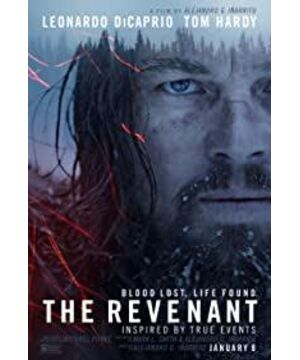Who can compare with the man at the top of the food chain, it really is not Xiao Li. Most of the time in the film, it is really like he is hosting a big reality show of survival in the wilderness-sucking bone marrow, eating raw meat, eating raw fish, engulfing dead horses, and fighting brown bears for 300 rounds.
But if you really want to ask what is the best among the Wilderness Hunters: good picture, good scenery, good lens, good music, good sound effects, good atmosphere, but Xiao Li’s performance is not conspicuous in front of so many [good], there is even one It doesn't feel so [good].
I believe that the audience who watched this film will be fascinated by the scenery along the Mississippi River in the film, which is similar to the New Zealand climate of the Lord of the Rings. Especially under the director's lens, any frame of pause can be perfect for the computer desktop. Quite seductive, just looking at the scenery can be worth the fare. The vast snow-capped mountains, wasteland, and dense forests reveal a layer of ruggedness, exaggerating the chill of killing. The plot of the movie happened during the severe winter. When the fog was up or the snow hits, even sitting in the warm theater, the author felt a bit of chill, a kind of cold that entered the body from the vision. With the solemn and powerful soundtrack of the film, the audience feels depressed and heavy. This is probably the tone set by the director for the entire film.
The film tells about the return of a man who has died once. He has an Indian wife and a mixed son, and has experienced a brutal Indian massacre. This reminds me of the hero of "The Last Samurai". The beginning of the film tells about the source of hatred. Most of the space is used to show the various dangers and tribulations of the protagonist on his way back. The final climax is naturally a duel with the enemy. Such a simple routine and the killing atmosphere of the film always reminds me of another film "Cold Mountain". The killing of hunters in the wilderness is no longer a simple murder. It involves an eternal topic in North America—the racial hatred between aliens and native Indians fighting for territory, there are also contradictions between poachers and guardians, and There is a trace of human entanglement (specifically reflected in the captain's asking Xiao Li to stay and wait for death and the hatred between Xiao Li and the villain).
However, this movie does not have a complicated or profound plot. It does not attempt to use plot layout or lines to make the audience think about those issues. Instead, it relies on cold shots, bloody pictures, cruel experiences, and depressive scenes. Atmosphere. The lens of this film is very immersive. In some places, it makes people feel like watching a 3D movie. It feels so immersive, as if you are that person. The powerful psychological suggestion function formed by all these attributes and characteristics allows all audiences to naturally feel what the director wants to convey. Of course, the visual cruel impact is the most direct. Many people may feel discomfort and nausea in the movie, not because of the blood but because of everything that Xiao Li will face.
Perhaps it is to perfectly render the atmosphere of the movie, in line with the silence and solemnity of the winter, to set off the deep hatred, the large number of shots in the shooting environment and the pure tone of voice in the film lengthened the length of the film and slowed the rhythm, making the author physically and mentally exhausted after watching the movie. , But more of it is actually heart tired. Accompanied by Xiao Li through such a frequently abused but always indestructible journey, suffering from the cruel and depressive visual and auditory impact, as well as the spiritual devastation full of deep hatred, who can walk out of the theater easily and happily.
Strictly speaking, Xiao Li has performed better in many previous works. The Wilderness Hunter is by no means his most brilliant film. It's just that although he won the Oscar from this film, although it is well-received, it is not really worthy of his name. It is a bit of charity and compassion in it. As for why he did better in the past but didn't win the prize, there is a taste of conspiracy theory.
(Produced by Shige, original article, no reprint without authorization)
Text:
Shige on March 19, 2016
View more about The Revenant reviews











